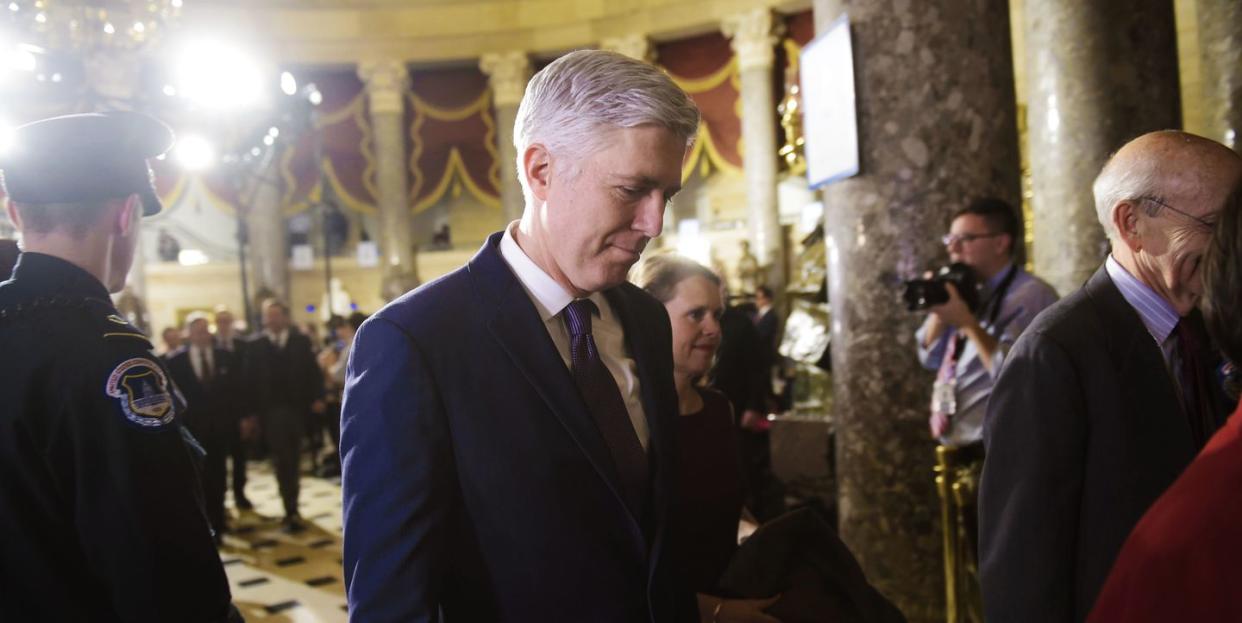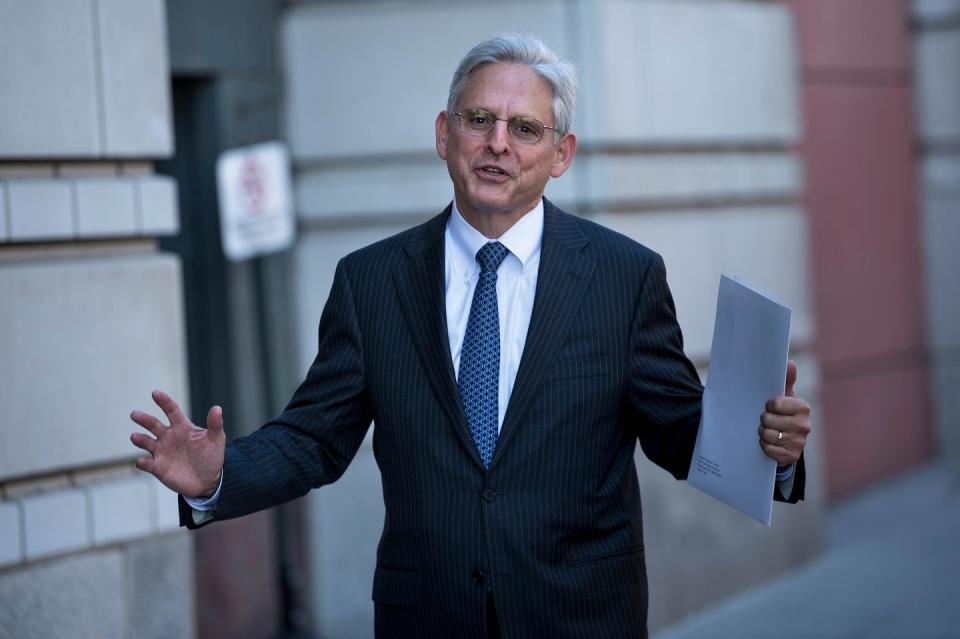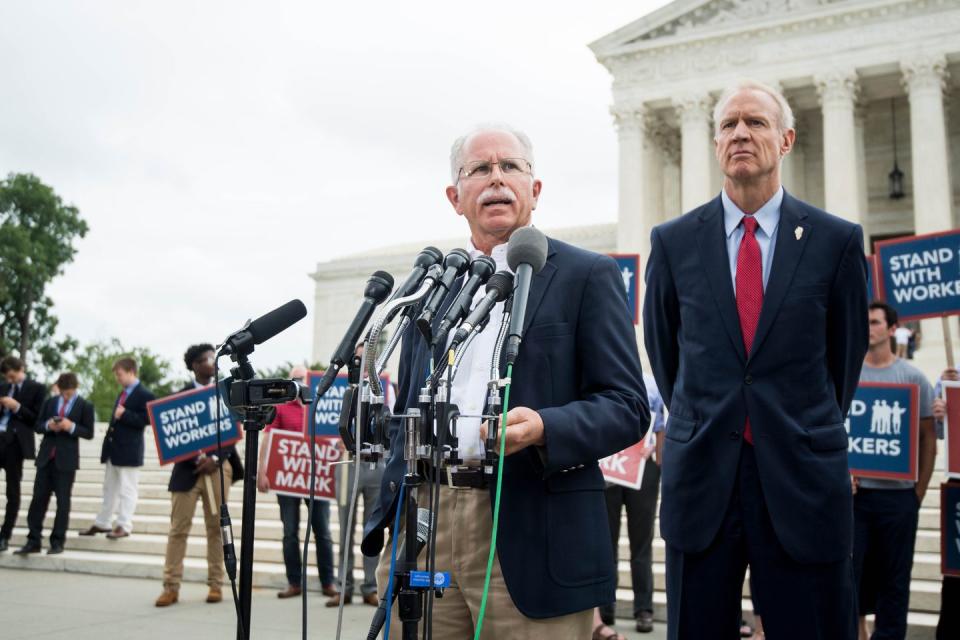Republicans Can Relax. SCOTUS Did Their Job.

Rather than dive right into the latest entry in this week’s Supreme Court Parade of Horribles, let’s state for the historical record that Barack Obama’s decision to nominate Merrick Garland to replace Antonin Scalia will go down through the years as the last in a series of doomed and useless attempts to demonstrate that our politics were in any way normal, and that the American people were too smart and too good to put up with a Republican Party the brains of which were being cored out by the prion disease of which it had been Patient Zero for the previous four decades.
Not that Garland wouldn’t have been a decent justice, or that what was done to him was anything within hailing distance of normal. It’s just that the strategy-find such a nice centrist that the Republicans would look silly in opposing him-was futile, being too clever by half, and being based on Obama’s destructive belief that everyone was as reasonable about the country as he was. It is now clear that he might as well have nominated 50 Cent, Zombie William Brennan, or Flipper. It would have made no difference. On Wednesday, we saw the final payoff.
In Janus v. AFSCME, by the now customarily loathsome 5-4 margin, the Court overturned a 40-year-old precedent and determined that, by being made to pay union dues, the free-speech rights of public employees were being infringed. (The precedent, Abood v. Detroit Board of Education, argued that the compulsory union dues were justified if the dues were used to pay for the union’s collective bargaining efforts and not for political activity. On Tuesday, the Court decided simply to obliterate that distinction.)

This is a completely political decision clearly based on purely political considerations. It is a blow struck against a vital Democratic political power base. (So, of course, in other ways, were the previous decisions regarding gerrymandering and voter-suppression.) It was a long-standing goal of the dark-money interests of American conservatism, which is the only constituency about which the Republican Party gives a damn any more, and within which the careers of people like Justices Samuel Alito and Neil Gorsuch were lovingly nurtured.
(This is why I am not as sanguine as some people are that it would have made any difference whether Obama nominated an uncomfirmable liberal instead of an unconfirmable centrist. But at least the fight would have been worth it. Neither would it have made a difference in the 2016 presidential campaign, either. Hillary Rodham Clinton’s campaign kept pounding on the importance of the courts while leftier-than-thou purists accused her of “extortion” for doing so. God, I continue to hate every damn second of that election.)
That network, empowered beyond reason by the Citizens United decision and its effectiveness intensified by the disemboweling of the Voting Rights Act, was described in great detail by Ken Vogel and Noam Schreiber in The New York Times back in February, when Janus was argued.
In fact, it was one prong of a broader campaign against public-sector unions, backed by some of the biggest donors on the right. It is an effort that will reach its apex on Monday, when the Supreme Court hears a case that could cripple public-sector unions by allowing the workers they represent to avoid paying fees. One of the institute’s largest donors is a foundation bankrolled by Richard Uihlein, an Illinois industrialist who has spent millions backing Republican candidates in recent years, including Gov. Scott Walker of Wisconsin, Senator Ted Cruz of Texas and Gov. Bruce Rauner of Illinois.
Tax filings show that Mr. Uihlein has also been the chief financial backer in recent years of the Liberty Justice Center, which represents Mark Janus, the Illinois child support specialist who is the plaintiff in the Supreme Court case. And Mr. Uihlein has donated well over $1 million over the years to groups like the Federalist Society that work to orient the judiciary in a more conservative direction. They have helped produce a Supreme Court that most experts expect to rule in Mr. Janus’s favor.
The case illustrates the cohesiveness with which conservative philanthropists have taken on unions in recent decades. “It’s a mistake to look at the Janus case and earlier litigation as isolated episodes,” said Alexander Hertel-Fernandez, a Columbia University political scientist who studies conservative groups. “It’s part of a multipronged, multitiered strategy.” In doing so, these donors have not just brought labor to the brink of crisis, but threatened the Democratic Party as well.
The majority helpfully underlined this point in its decision on Tuesday.
Janus’s concern about Illinois’ current financial situation is shared by the Governor of the State, and it was the Governor who initially challenged the statute authorizing the imposition of agency fees. The Governor commenced an action in federal court, asking that the law be declared unconstitutional, and the Illinois attorney general (a respondent here) intervened to defend the law.
Even assuming it’s real, which I don’t, what the hell does Janus’ concern-let alone Rauner’s concern-for Illinois budget woes have to do with weaponizing the First Amendment against the Democratic political base? At least hide it a little better than that, fellas.
So, now, there’s a free ticket to freeload on the people in your union who pay their dues, who soon will decide they are being suckers and stop paying those dues as well, and the power of public sector unions will go the way of the power of organized labor in the private sector. In addition, Alito seems to find free speech in other odd places as well.
It is also significant that the Court decided Abood against a very different legal and economic backdrop. Public-sector unionism was a relatively new phenomenon in 1977. The first State to permit collective bargaining by government employees was Wisconsin in 1959, R. Kearney & P. Mareschal, Labor Relations in the Public Sector 64 (5th ed. 2014), and public-sector union membership remained relatively low until a “spurt” in the late 1960’s and early 1970’s, shortly before Abood was decided, Freeman, Unionism Comes to the Public Sector, 24 J. Econ. Lit. 41, 45 (1986). Since then, public-sector union membership has come to surpass private-sector union membership, even though there are nearly four times as many total private-sector employees as public-sector employees. B. Hirsch & D. Macpherson, Union Membership and Earnings Data Book 9–10, 12, 16 (2013 ed.). This ascendance of public-sector unions has been marked by a parallel increase in public spending…Not all that increase can be attributed to public-sector unions, of course, but the mounting costs of public-employee wages, benefits, and pensions undoubtedly played a substantial role. We are told, for example, that Illinois’ pension funds are underfunded by $129 billion as a result of generous public-employee retirement packages. Brief for Jason R. Barclay et al. as Amici Curiae 9, 14. Unsustainable collective bargaining agreements have also been blamed for multiple municipal bankruptcies. See Brief for State of Michigan et al. as Amici Curiae 10–19. These developments, and the political debate over public spending and debt they have spurred, have given collective-bargaining issues a political valence that Abood did not fully appreciate.
Is this a decision in constitutional law or Scott Walker’s next re-election spot? And the undisguised glee with which Alito overrules Abood gives the rest of the game away.

As is customary now in such matters, we have the usual “blistering” dissent, this time from Justice Elena Kagan, who can clearly see a church by daylight here.
Not any longer. Today, the Court succeeds in its 6-year campaign to reverse Abood. See Friedrichs v. California Teachers Assn., 578 U. S. ___ (2016) (per curiam); Harris v. Quinn, 573 U. S. ___ (2014); Knox v. Service Employees, 567 U. S. 298 (2012). Its decision will have large-scale consequences. Public employee unions will lose a secure source of financial support. State and local governments that thought fair-share provisions furthered their interests will need to find new ways of managing their workforces. Across the country, the relationships of public employees and employers will alter in both predictable and wholly unexpected ways. Rarely if ever has the Court overruled a decision-let alone one of this import-with so little regard for the usual principles of stare decisis. There are no special justifications for reversing Abood. It has proved workable. No recent developments have eroded its underpinnings. And it is deeply entrenched, in both the law and the real world. More than 20 States have statutory schemes built on the decision. Those laws underpin thousands of ongoing contracts involving millions of employees. Reliance interests do not come any stronger than those surrounding Abood. And likewise, judicial disruption does not get any greater than what the Court does today.
The majority has overruled Abood for no exceptional or special reason, but because it never liked the decision. It has overruled Abood because it wanted to.
Now that this term of the Supreme Court is over, what have we learned? That untoward remarks at a committee meeting are enough to allow merchants to discriminate against gay people (Masterpiece Cake Shop), but that the Texas legislature must be assumed to have acted in good faith when it made interim voting maps-that were clearly discriminatory-permanent (Abbott v Perez), and that the president* must be presumed not to be acting out of religious bigotry in office just because he was a howling religious bigot throughout his campaign for president (Trump v. Hawaii).The basic rule going forward seems to be, feel free to be a bigot, feel free to discriminate, just don’t leave a paper trail behind you.
(Chief Justice John Roberts is being celebrated for taking the odious Koretmatsu decision out of play once and for all, despite the fact that Roberts practically wrote an instruction manual on how you could craft a Korematsu-like policy that he’d support. Just create detention camps that are open to everyone. That is now the state of American liberty.)
And freeloading is now free speech because Illinois can’t balance its budget. The Republican platform committee can take the next two years off. The Supreme Court has done its job for it.
Respond to this post on the Esquire Politics Facebook page here.
You Might Also Like

